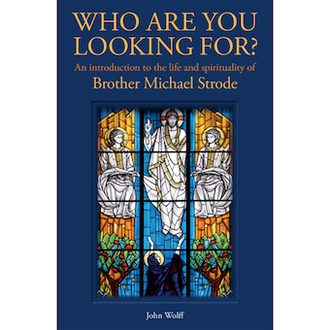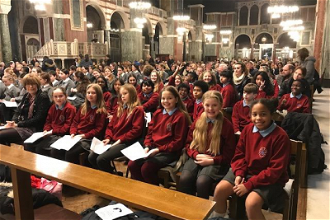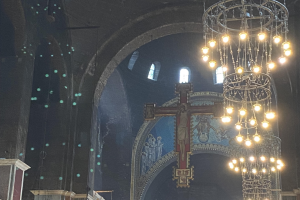Brother Michael Strode biography: 'Who Are You Looking For?'

The subtitle of this book is 'An introduction to the life and spirituality of Brother Michael Strode.' It is an unabashedly Christian biography, in times when humble holy lives do not make headline news.
Its author knew Michael Strode (1923-2019) for over 60 years and has based his book on many conversations they had over the years, his subject's diaries and notebooks and the tributes paid to Strode after his death. Its title, recognisable to those who know their New Testament, refers to Our Lord's words after his resurrection to Mary Magdalene in St John's Gospel. At the time he read them Strode, who had become an agnostic, was in his final year of medical school. He relates, "suddenly I felt this story had to be true." He followed his mother into the Catholic Church in 1945, aged 22.
The whole of Strode's life as a doctor was subsequently spent at Chailey Heritage School and Hospital for children with physical disabilities. Many of these patients were polio and thalidomide victims or had cerebral palsy or spina bifida. Strode was dedicated to his profession. His biographer writes that he brought "qualities of gentleness, patience and unselfishness" to his work and these characteristics were noticed by all who knew him, children and staff alike. He never patronised his patients and had an innate respect for each person he was treating. Of course, this should be standard practice in a doctor-patient relationship, whether child or adult, but it is not always the case.
Michael Strode had already visited the French Catholic shrine to Our Lady of Lourdes in 1951 and 1952 and wanted children from Chailey to experience a week of fun and faith there too. He conceived the idea of what became known as the Handicapped Children's Pilgrimage Trust. This name was later modified to: Hosanna House and Children's Pilgrimage Trust when the word 'handicapped' stopped being common usage. The first group was taken in 1956. It was ecumenical and non-denominational and the children stayed in a hotel rather than a hospital, going to cafes and on day trips so as to have as normal an experience as possible.
Strode was firmly against the kind of "helpless pity" often shown by people towards disabled people; he knew his charges longed to be treated simply like everyone else. As the HCPT grew, the children were organised into groups of about 20: 10 children and 10 helpers, including a group leader a chaplain and a qualified nurse. Today, the HCPT is a charity with its roots in the Catholic faith but is open to all. Volunteers and beneficiaries come from all walks of life and from all faiths and none. HCPT is still led by lay people, numbers about 5000 pilgrims at Eastertime; and the features of the early pilgrimages remain.
Lourdes is sometimes associated with sensational miracles. These have occurred and are thoroughly investigated and well-documented - but they are extraordinarily rare. As Strode observed, there is a more common kind of miracle: "The love that can grow so quickly and so strongly within a group - a miracle of love." John Wolff, his biographer, comments that participants, "gain real sympathy for others, and the grace to accept the difficulties and frustrations of their own disabilities." This, as we know from our own circumstances, can have a wider application.
Strode retired from Chailey Heritage Hospital in 1988, aged 65, after 35 years of devoted service. He had also spent 33 active and tireless years with the HCPT as 'Doctor Michael.' But unlike those who look forward to retirement from work as an opportunity to travel or play golf, he felt overwhelmingly drawn to the religious life. This would not have been a surprise to those who knew him well and were aware of his deep prayer life, generally concealed behind his gentle, dedicated medical persona.
In 1991 he spent three weeks living with the Cistercian community of monks on Caldey Island, a short boat ride from Tenby in Wales. Aged 68 he chose to join them - so his next 28 years were spent as a contemplative oblate: 'Brother Michael.' Perhaps this is not as unusual as it sounds; I have read of several doctors who eventually became priests or joined religious orders. Possibly, the service of the physically sick evolves for a few into a more general service on behalf of the "soul of the world"?
Many people might think that to live as a monk in a monastery on an island is an extreme form of escape from the rigours of life. But monks have their own struggles, as we all do. Brother Michael made promises of poverty, chastity, obedience and stability when he joined Caldey Abbey and participated in daily communal prayer, private study, manual work, eating a vegetarian diet and observing silence between 7am-7pm. His particular job - apart from helping in the kitchens and the laundry - was attending to the medical needs of the community.
Wolff quotes many extracts from Brother Michael's diaries and from prayer cards the latter printed and distributed to his wide circle of friends. He struggled with selfishness and sloth, humbly revealing his "weaknesses and failures, the challenges and temptations of daily life." As a saintly man, he "set himself very high standards" and was more aware of his faults than most. His prayer cards constantly remind their readers of "our need for Christ"; this was the core of Brother Michael's teaching. He would write, "It is because God has loved us that we are able to love others", and "without God, we are totally incapable of loving."
Wolff concludes his biography by reminding readers that his old friend's life and example "shows us that we can influence others by the way we lead our lives more than through any worldly achievements." As a young man Strode had been influenced by his own mother's life of faith-filled loving service to her family. Readers who feel helpless to right the many self-evident wrongs of the world may be encouraged by coming to know one quiet, humorous, unassuming individual whose life has influenced many people for good.
Francis Phillips is a former book reviewer for the Catholic Herald.
John Wolff is an ex HCPT Group Leader and Trustee.
LINKS
'Who are you looking for? An introduction to the life and spirituality of Brother Michael Strode' by John Woolf can be ordered online www.charitycardshop.com/hcpt/product/1
£15 plus postage, with all profits going towards causes connected with Michael Strode.
The Cause for Canonisation of Brother Michael Strode - www.brothermichaelstrode.org/


















